- Home
- André Aciman
Find Me
Find Me Read online
Begin Reading
Table of Contents
A Note About the Author
Copyright Page
The author and publisher have provided this e-book to you for your personal use only. You may not make this e-book publicly available in any way. Copyright infringement is against the law. If you believe the copy of this e-book you are reading infringes on the author’s copyright, please notify the publisher at: us.macmillanusa.com/piracy.
Para mis tres hijos
TEMPO
Why so glum?
I watched her get on at the station in Florence. She slid open the glass door and, once inside the car, looked around, then right away dumped her backpack on the empty seat next to mine. She took off her leather jacket, put down the English-language paperback she was reading, then placed a square white box on the luggage rack and threw herself onto the seat diagonally across from mine in what seemed a restless, ill-tempered huff. She reminded me of someone who’d just had a heated argument seconds before boarding and was still stewing over the cutting words either she or someone else had spoken before hanging up. Her dog, which she was trying to keep tucked between her ankles while holding a red leash looped around her fist, seemed no less jittery than she was. “Buona, good girl,” she finally said, hoping to calm it down, “buona,” she repeated, as the dog still fidgeted and tried to squirm out of the firm grip. The presence of the dog annoyed me, and instinctively I refused to uncross my legs or budge to make room for it. But she didn’t seem to notice either me or my body language. Instead, she immediately rummaged through the backpack, found a slim plastic bag, and took out two tiny bone-shaped treats for the dog, then laid them in her palm and watched the dog lick them off. “Brava.” With the dog momentarily placated, she half lifted herself to fix her shirt, shifted in her seat once or twice, then slumped into a sort of upset stupor, staring out indifferently at Florence as the train began to pull out of the Santa Maria Novella station. She was still stewing and, perhaps without noticing, shook her head, once, twice, obviously still cussing whomever she’d quarreled with before boarding. For a moment she looked so totally forlorn that, while staring at my open book, I caught myself struggling to come up with something to say, if only to help defuse what had all the bearings of a gathering storm about to erupt in our little corner at the very end of the car. Then I thought twice about it. Better to leave her alone and go on with my reading. But when I caught her looking at me, I couldn’t help myself: “Why so glum?” I asked.
Only then did it occur to me how thoroughly inappropriate my question must have sounded to a complete stranger on a train, to say nothing of one who seemed ready to explode at the slightest provocation. All she did was stare at me with a baffled, hostile glint in her eyes that presaged the very words about to cut me down and put me in my place. Mind your own business, old man. Or: What’s it to you, anyway? Or she’d make a face and utter a withering rebuke: Jerk!
“No, not glum, just thinking,” she said.
I was so taken aback by the gentle, almost rueful tone of her reply that I was left more speechless than if she had told me to fuck off.
“Maybe thinking makes me look glum.”
“So yours are happy thoughts?”
“No, not happy either,” she replied.
I smiled but said nothing, already regretting my shallow, patronizing banter.
“But maybe glum after all,” she added, conceding the point with a subdued laugh.
I apologized for sounding tactless.
“No need,” she said, already scanning the beginnings of the countryside outside the window. Was she American, I asked. She was. “Me too,” I said. “I could tell from your accent,” she added with a smile. I explained that I’d been living in Italy for almost thirty years, but couldn’t for the life of me undo the accent. When I asked, she replied she had settled in Italy with her parents when she was twelve.
We were both headed for Rome. “For work?” I asked.
“No, not work. It’s my father. He’s not well.” Then, raising her eyes at me: “Might explain the glumness, I suppose.”
“Is it serious?”
“I think so.”
“I’m sorry,” I said.
She shrugged her shoulders. “Life!”
Then, changing her tone: “And you? Business or pleasure?”
I smiled at the mock-formulaic question and explained that I had been invited to give a reading to university students. But I was also meeting my son, who lived in Rome and was picking me up at the station.
“Surely a sweet boy.”
I could tell she was being facetious. But I liked her breezy, informal manner that skidded from sullen to sprightly and assumed mine did as well. Her tone jibed with her casual clothes: scuffed hiking boots, a pair of jeans, no makeup, and a half-unbuttoned, faded, reddish lumberjack shirt worn over a black T-shirt. And yet, despite the rumpled look, she had green eyes and dark eyebrows. She knows, I thought, she knows. Probably knows why I made that silly comment about her glumness. I was sure strangers were always finding one pretext or another to start a conversation with her. Which explains that irritated don’t you even try look she projects wherever she goes.
After her ironic comment about my son, I was not surprised to find our conversation lagging. Time to pick up our respective books. But then she turned to me and asked point-blank: “Are you excited about seeing your son?” Again, I thought she was ribbing me somehow, but her tone was not flippant. There was something at once alluring and disarming in the way she got personal and cut straight through the hurdles between strangers on a train. I liked it. Perhaps she wanted to know what a man almost twice her age felt before meeting his son. Or perhaps she simply didn’t feel like reading. She was waiting for me to answer. “So, are you happy—maybe? Nervous—maybe?”
“Not really nervous, or just a bit, perhaps,” I said. “A parent is always scared of being an imposition, to say nothing of a bore.”
“You think you’re a bore?”
I loved that what I’d just said had caught her by surprise.
“Maybe I am. But then, let’s face it, who isn’t.”
“I don’t think my father is a bore.”
Had I perhaps offended her? “Then I take it back,” I said.
She looked at me and smiled. “Not so fast.”
She prods, then drills right through you. In this, she reminded me of my son—she was slightly older, but had the same ability to call out all my gaffes and cagey little ploys, leaving me scuttled after we’d argued and made up.
What kind of person are you when someone gets to know you? I wanted to ask. Are you funny, jovial, playful, or is there a glum, ill-tempered serum coursing in your veins that clouds your features and blots out all the laughter promised by that smile and those green eyes? I wanted to know—because I couldn’t tell.
I was about to compliment her on her ability to read people so well when her phone rang. Boyfriend, of course! What else. I’d grown so used to constant cell phone interruptions, that it was no longer possible for me to meet students over coffee or talk to my colleagues or to my son even without a mobile phone call barging in. Saved by the phone, silenced by the phone, shunted by the phone.
“Hi, Pa,” she said as soon as it rang. I believed she was picking up the phone right away to prevent the loud chime from disturbing other passengers. But what surprised me was how she yelled into her phone. “It’s the damned train. It stopped, I’ve no idea for how long, but should be no more than two hours. See you soon.” The father was asking her something. “Of course I did, you old goon, how could I forget.” He asked something else. “That too.” Silence. “Me too. Lots and lots.”
She clicked off the phone and tossed it into her backpack, as if to say: We’re not going to be in
terrupted again. She gave me an uneasy smile. “Parents,” she finally said, meaning The same everywhere, aren’t they?
But then she explained. “I see him every weekend—I’m his weekend wallah—my siblings and his caregiver take care of him weekdays.” Before giving me a chance to say another word, she asked, “So, did you prettify yourself for tonight’s event?”
What a way to describe what I wore! “Do I look prettified?” I replied, bandying the word back at her in jest so she’d not think I was fishing for compliments.
“Well, the pocket square, the well-pressed shirt, no tie, but then the cuff links? I’d say you gave it some thought. Old-school a bit, but dapper.”
We both smiled.
“Actually, I have this,” I said, half removing a colorful necktie from my jacket pocket and slipping it back in. I wanted her to see that I had enough of a sense of humor to poke fun at myself.
“Just as I thought,” she said. “Prettified! Not like a retired professor in Sunday clothes, but almost. So, what do the two of you do in Rome?”
Was she ever going to let up? Had I started something with my initial question that made her think we could be so informal? “We meet every five or six weeks. He’s been living in Rome but will soon be moving to Paris. I miss him already. I like spending the day with him; we do nothing, really, mostly walk, though it usually turns out to be the same walk: his Rome, by the conservatory, my Rome, where I used to live as a young teacher. Eventually we’ll always have lunch at Armando’s. He puts up with me or maybe he enjoys my company, I still can’t tell, maybe both, but we’ve ritualized these visits: Via Vittoria, Via Belsiana, Via del Babuino. Sometimes we wander off all the way to the Protestant Cemetery. They’re like the markers of our lives. We’ve nicknamed them our vigils after the way pious people stop at various madonnelle—street shrines—to pay homage to the Madonna of the street. Neither of us forgets: lunch, walk, vigils. I’m lucky. Walking around Rome with him is itself a vigil. Everywhere you turn you stumble on memories—your own, someone else’s, the city’s. I like Rome at twilight, he likes it afternoons, and there’ve been times when we’ll have an afternoon tea anywhere just to drag things out a bit till evening sets in and we have drinks.”
“And that’s it?”
“That’s it. We’ll walk Via Margutta for me, then Via Belsiana for him—old loves in both our cases.”
“Vigils of past vigils?” joked the young woman on the train. “Is he married?”
“No.”
“Does he have someone?”
“I don’t know. I suspect there must be someone. But I do worry about him. There was someone quite a while back and I did ask if there was anyone now, but all he did was shake his head and say, ‘Don’t ask, Papa, don’t ask.’ It meant no one or everyone, and I couldn’t tell which was worse. He used to be so open with me.”
“I think he was being honest with you.”
“Yes, in a way.”
“I like him,” said the young woman sitting diagonally across from me. “Maybe because I’m very much the same. Sometimes I’m blamed for being too open, too forward, and then for being too guarded and withdrawn.”
“I don’t think he’s withdrawn with others. But I don’t think he’s very happy.”
“I know how he feels.”
“Isn’t there someone in your life?”
“If you only knew.”
“What?” I asked. The word sprang out of me like a surprised and doleful sigh. What could she mean—that there was no one in her life, or that there were too many, or that the man in her life had walked out on her and left her devastated with nothing but an urge to take out her anger on herself or on a succession of beaux? Or did people simply come and go, come and go, as I feared so many did with my own son—or was she the sort who slips in and out of people’s lives without leaving a trace or a keepsake?
“I don’t know if I’m the type who even likes people, much less falls in love with them.”
I could just see it in the two of them: the same embittered, impassive, injured hearts.
“Is it that you don’t like people, or that you just grow tired of them and can’t for the life of you remember why you ever found them interesting?”
She was suddenly quiet, looked totally startled, and didn’t utter a word. Her eyes stared straight at me. Had I offended her again? “How could you have known that?” she finally asked. This was the first time I’d seen her turn serious and look cross. I could see her whetting some well-honed words with which to cut down my presumptuous meddling into her private life. I shouldn’t have said anything. “We’ve met no more than fifteen minutes ago, and yet you know me! How could you have known this about me?” Then, catching herself: “How much do you charge an hour?”
“On the house. But if I know anything it’s because I think we’re all like that. Plus, you’re young and you’re beautiful, and I’m sure men gravitate to you all the time, so it’s not that you have a hard time meeting someone.”
Had I once again spoken out of turn and crossed a line?
To walk back the compliment, I added, “It’s just that the magic of someone new never lasts long enough. We only want those we can’t have. It’s those we lost or who never knew we existed who leave their mark. The others barely echo.”
“Is this the case with Miss Margutta?” she asked.
This woman doesn’t miss a beat, I thought. I liked the name Miss Margutta. It cast whatever existed years ago between us in a mild and docile, almost laughable light.
“I’ll never really know. We were together for so short a while and it happened so fast.”
“How long ago?”
I thought for a moment.
“I’m ashamed to say.”
“Oh, just say it!”
“At least two decades. Well, almost three.”
“And?”
“We met at a party when I was a teacher in Rome at the time. She was with someone, I was with someone, we happened to speak, and neither wished to stop. Eventually she and her boyfriend left the party, and soon after, we left as well. We didn’t even exchange numbers. But I couldn’t put her out of my mind. So I called the friend who’d invited me to the party and asked if he had her phone number. And here is the joke. A day earlier, she’d called him to ask for my phone number. ‘I heard you were looking for me,’ I said when I finally called her. I should have introduced myself, but I wasn’t really thinking, I was nervous.
“She recognized my voice right away, or perhaps our friend had already warned her. ‘I was going to call you,’ she said. ‘But you didn’t,’ I replied. ‘No, I didn’t.’ Which is when she said something that showed she had more courage than I and it sent my pulse racing, because I didn’t expect it and will never forget it. ‘So, how do we do this?’ she asked. How do we do this? With that one sentence I knew my life was being pushed out of its familiar orbit. No one I knew had ever directed such frank, almost feral words at me.”
“I like her.”
“What was there not to like. Blunt and forward, and so to-the-point that I had to make a decision right then and there. ‘Let’s have lunch,’ I said. ‘Because dinner is difficult, right?’ she asked. I loved the bold, implicit irony in what she’d said. ‘Let’s have lunch—as in today,’ I said. ‘As in today it is.’ We laughed at the speed with which things were happening. Lunch, that day, was scarcely an hour away.”
“Did it bother you that she meant to cheat on her boyfriend?”
“No. Nor did it bother me that I was doing the same thing. The lunch lasted a long time. I walked her to her home on Via Margutta, then she walked me back to where we’d had lunch, and then I walked her back to her home again.
“‘Tomorrow?’ I asked, still uncertain whether I wasn’t pushing things. ‘Absolutely, tomorrow.’ It was the week before Christmas. By Tuesday afternoon we did something totally crazy: we bought two plane tickets and flew to London.”
“So romantic!”
“Everything went so
fast and felt so natural, that neither saw the need to discuss the matter with our partners or give them a second thought. We simply let go all our inhibitions. In those days we still had inhibitions.”
“You mean unlike today?”
“I wouldn’t know.”
“No, I suppose you wouldn’t.”
Her oblique taunt let me know I was meant to be slightly riled.
I chuckled.
She did as well, her way of signaling that she knew I was being disingenuous.
“In any event, it ended right away. She went back to her boyfriend, and I to my girlfriend. We did not remain friends. But I attended their wedding, and eventually I invited them to ours. They stayed married. We didn’t. Voilà.”
“Why did you let her go back to her boyfriend?”
“Why? Perhaps because I was never totally persuaded by my feelings. I just didn’t fight to keep her, which she already knew I wouldn’t. Perhaps I wanted to be in love and feared I wasn’t and preferred our little limbo in London to facing up to what I didn’t feel for her. Perhaps I preferred to doubt rather than know. So how much do you charge per hour?”
“Touché!”
When was the last time I’d spoken to someone like this?
“So tell me about the person in your life,” I said. “I’m sure you’re seeing someone special right now?”
“Seeing someone, yes.”
“For how long?” Then I stopped short. “If I may ask.”
“You may ask. Barely four months.” Then, shrugging her shoulders: “Doesn’t merit writing home about.”
“Do you like him?”
“I like him fine. We get along. And we like many of the same things. But we’re just two roommates pretending to have a life together. We don’t.”
“What a way to put it. Two roommates pretending to have a life together. Sad.”
“It is sad. But what’s also sad is that, in these past few moments, I may have shared more with you than in a whole week with him.”
“Maybe you’re not the kind who opens up to people.”

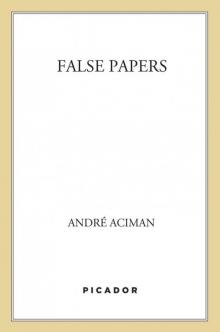 False Papers
False Papers Harvard Square
Harvard Square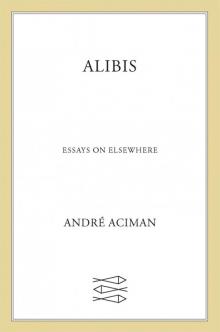 Alibis
Alibis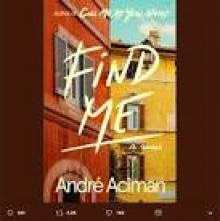 Find Me
Find Me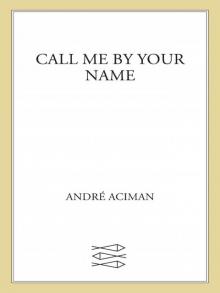 Call Me by Your Name
Call Me by Your Name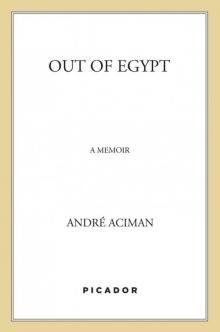 Out of Egypt: A Memoir
Out of Egypt: A Memoir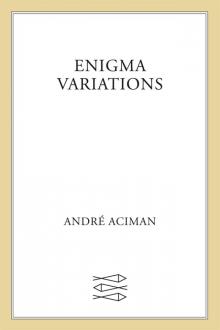 Enigma Variations
Enigma Variations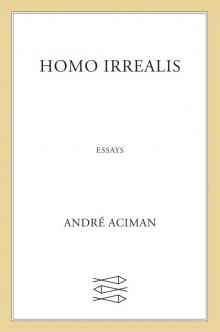 Homo Irrealis
Homo Irrealis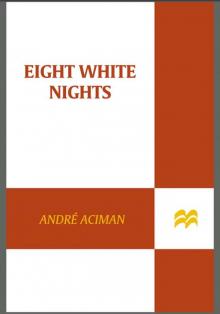 Eight White Nights
Eight White Nights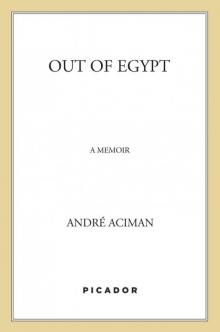 Out of Egypt
Out of Egypt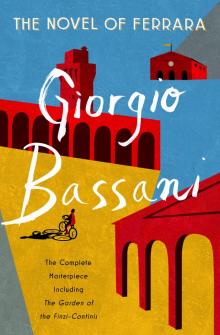 The Novel of Ferrara
The Novel of Ferrara Harvard Square: A Novel
Harvard Square: A Novel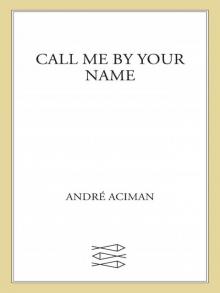 Call Me by Your Name: A Novel
Call Me by Your Name: A Novel